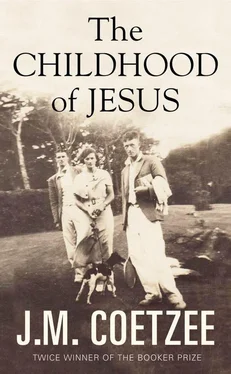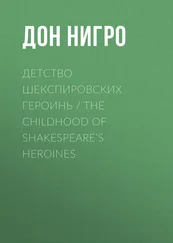‘I won’t. It’s secret.’
Inés is absorbed in culinary tasks. She does not even look up as he leaves.
A day passes before his next visit. He finds the boy poring over the book as before. He tries to speak, but the boy gestures impatiently — ‘Ssh!’ — and turns the page with a quick, whipping motion as though a snake lay behind it that might strike him.
The picture shows Don Quixote, trussed in a cradle of rope, being lowered into a hole in the earth.
‘Do you want me to help? Shall I tell you what is happening?’ he asks.
The boy nods.
He takes up the book. ‘This is an episode called ‘The Cave of Montesinos’. Having heard much about the Cave of Montesinos, Don Quixote resolved to see for himself its famed wonders. So he instructed his friend Sancho and the learned scholar — the man with the hat must be the learned scholar — to lower him into the dark cave, and then to wait patiently for his signal to haul him up again.
‘For a full hour Sancho and the scholar sat waiting at the mouth of the cave.’
‘What is a scholar?’
‘A scholar is a man who has read lots of books and learned lots of things. For a full hour Sancho and the scholar sat waiting until at last they felt a tug on the rope and began to haul, and thus Don Quixote came riding up into the light.’
‘So Don Quixote wasn’t dead?’
‘No, he wasn’t dead.’
The boy heaves a happy sigh. ‘That’s good, isn’t it?’ he says.
‘Yes, of course it’s good. But why did you think he was dead? He is Don Quixote. He is the hero.’
‘He is the hero and he is a magician. You tie him up with ropes and put him in a box and when you open the box he isn’t there, he has escaped.’
‘Oh, did you think Sancho and the scholar tied Don Quixote up? No, if you were to read the book instead of just looking at the pictures and guessing at the story, you would know that they use the rope to haul him out of the cave, not to tie him up. Shall I go on?’
The boy nods.
‘Graciously Don Quixote thanked his friends. Then he regaled them with an account of all that had passed in the Cave of Montesinos. In the three days and three nights he had spent under the earth, he said, he had seen many wondrous sights, not least of them waterfalls whose cascades were not drops of water but sparkling diamonds, and processions of princesses in satin robes, and even, the greatest marvel of all, the Lady Dulcinea mounted on a white steed with a jewel-encrusted bridle, who stopped and kindly spoke to him.
‘ But your honour , said Sancho, surely you are mistaken, for you were under the earth not three days and three nights but a mere hour at most .
‘ No, Sancho , said Don Quixote gravely, three days and three nights I was absent; if it seemed to you a mere hour, that was because you fell into a slumber while you waited, and were oblivious of the passing of time .
‘Sancho was about to argue, but then thought better of himself, remembering how obstinate Don Quixote could be. Yes, your honour , he said, glancing at the learned scholar and winking, you must be right: for three whole days and three whole nights we two were in a slumber, until your return. But pray tell us more of the Lady Dulcinea and what passed between her and yourself .
‘Gravely Don Quixote regarded Sancho. Sancho , he said, O friend of little faith, when will you learn, when will you learn? And he fell silent.
‘Sancho scratched his head. Your honour , he said, I will not deny it is hard to believe you spent three days and three nights in the Cave of Montesinos when to us it seemed a mere hour; and so I will not deny it is hard to believe that there are at this very minute troops of princesses beneath our feet, and ladies prancing on snow-white steeds, and suchlike. Now if the Lady Dulcinea had bestowed on your honour some token of her troth, such as a ruby or a sapphire from the bridle of her mount, which you could show to miserable doubters like ourselves, it would be a different matter.
‘ A ruby or a sapphire , mused Don Quixote. I should show you a ruby or a sapphire as proof I am not lying .
‘ So to speak , said Sancho. So to speak .
‘ And if I were to show you such a ruby or sapphire, Sancho, what then?
‘ Then I would fall to my knees, your honour, and kiss your hand, and beg your pardon for ever doubting you. And I would be your faithful follower to the end of time .’
He closes the book.
‘And?’ says the boy.
‘And nothing. That is the end of the chapter. Until tomorrow there is no more.’
The boy takes the book from his hands, reopens it to the picture of Don Quixote in his rope truss, stares hard at the surrounding body of print. ‘Show me,’ he says in a small voice.
‘Show you what?’
‘Show me the end of the chapter.’
He points to the end of the chapter. ‘See, here begins a new chapter, called Don Pedro y las marionetas , Don Pedro and the Puppets. The Cave of Montesinos is behind us.’
‘But did Don Quixote show Sancho the ruby?’
‘I don’t know. Señor Benengeli does not say. Perhaps he did, perhaps he didn’t.’
‘But really did he have a ruby? Really was he under the ground three days and three nights?’
‘I don’t know. Maybe for Don Quixote time is not as it is for us. Maybe what is for us the blink of an eyelid is for Don Quixote a whole aeon. But if you are convinced that Don Quixote ascended from the cave with rubies in his pockets, maybe you should write your own book saying so. Then we can return señor Benengeli’s book to the library and read yours instead. Unfortunately, however, before you can write your book you will have to learn to read.’
‘I can read.’
‘No, you can’t. You can look at the page and move your lips and make up stories in your head, but that is not reading. For real reading you have to submit to what is written on the page. You have to give up your own fantasies. You have to stop being silly. You have to stop being a baby.’
Never before has he spoken so directly to the child, so harshly.
‘I don’t want to read your way,’ says the child. ‘I want to read my way. There was a man of double deed and nandynandynandy need, and when he rode he was a horse and when he walked he was a porse.’
‘That is nothing but nonsense. There is no such thing as a porse. Don Quixote is not nonsense. You can’t just make up nonsense and pretend you are reading about him.’
‘I can! It’s not nonsense and I can read! It’s not your book, it’s my book!’ And with a frown he returns to whipping furiously through the pages.
‘On the contrary, it’s señor Benengeli’s book that he gave to the world, therefore it belongs to all of us — to all of us in one sense, and to the library in another sense, but not to you alone in any sense. And stop tearing at the pages. Why are you handling the book so roughly?’
‘Because. Because if I don’t hurry a hole will open.’
‘Open up where?’
‘Between the pages.’
‘That’s nonsense. There is no such thing as a hole between the pages.’
‘There is a hole. It’s inside the page. You don’t see it because you don’t see anything.’
‘Stop that now!’ says Inés.
For an instant he thinks she is addressing the child. For an instant he thinks she has at last aroused herself to rebuke him for his wilfulness. But no, it is he at whom she is glaring.
‘I thought you wanted him to learn to read,’ he says.
‘Not at the cost of all this bickering. Find another book. Find a simpler book. This Don Quixote is too difficult for a child. Take it back to the library.’
Читать дальше












